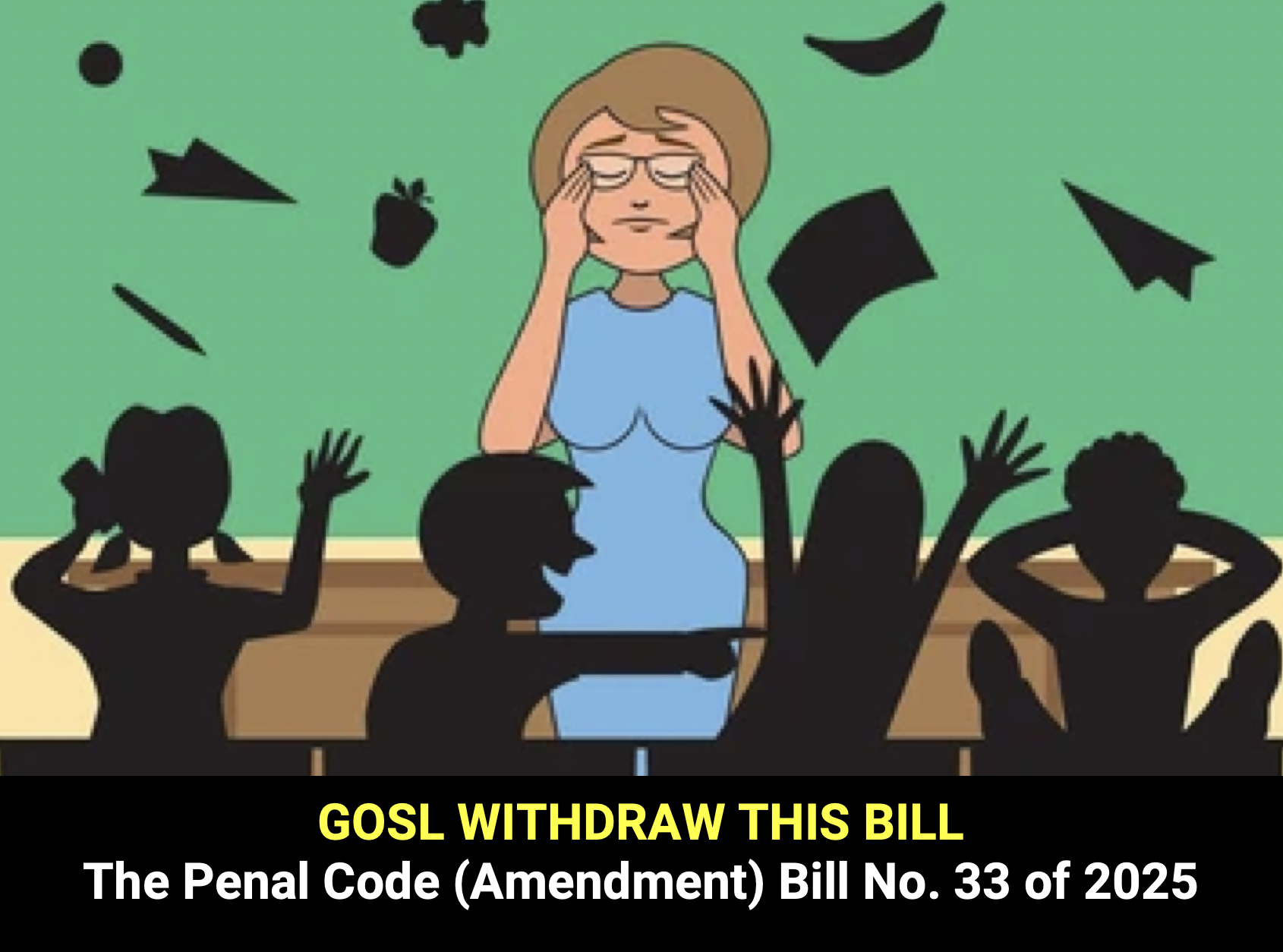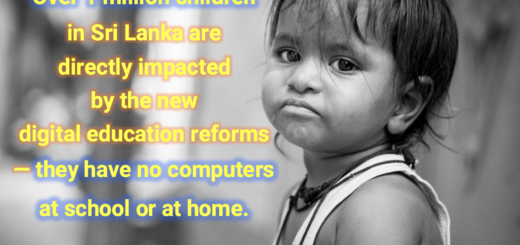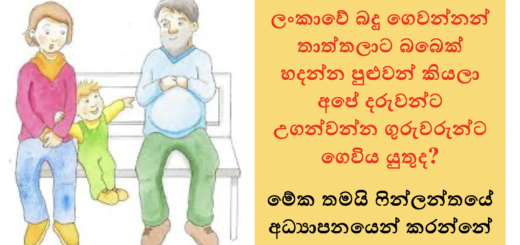Public Alert: Dangerous Consequences of the Penal Code (Amendment) Bill No. 33 of 2025

The Penal Code (Amendment) Bill No. 33 of 2025, recently passed by the Sectoral Oversight Committee on Governance, Justice and Civil Protection—chaired by Hon. Dr. Najith Indika and including members Mujibur Rahman, M.K.M. Aslam, Sellaththamby Thilaganathan, Attorney-at-Law Thushari Jayasingha, Major General (Rtd.) G.D. Sooriyabandara, Hon. Ajith P. Perera, Attorney-at-Law (Mrs.) Chamindranee Kiriella, Attorney-at-Law Chithral Fernando, and Attorney-at-Law (Mrs.) Anushka Thilakarathne—claims to protect children. However, it introduces sweeping, ambiguous definitions that threaten parents, teachers, and traditional Sri Lankan upbringing. The Govt must WITHDRAW the BILL. The damage the Govt will cause by this Bill is irreversible.
https://documents.gov.lk/view/bills/2025/8/630-2025_E.pdf
The Bill establishes no boundaries for children, and does not recognize the duties of students, teachers, or parents. Respect for elders, authority, and moral obligations in line with our civilizational cultural heritage are omitted, creating a one-sided legal framework that shifts all power to the child, leaving adults vulnerable and guidance ineffective.
The Bill focuses entirely on what adults cannot do to children, but it:
- Does not define or emphasize children’s duties— no mention that children have responsibilities to behave respectfully, obey rules, or not manipulate adults.
- Ignores the reciprocal social contract— duties of teachers to teach, parents to guide, and children to respect and learn.
- Disregards cultural norms of hierarchy and moral guidance— Sri Lanka’s upbringing traditionally emphasizes duty, discipline, and respect for elders; the Bill is silent on these.
- No boundaries for children’s legal leverage— any perceived “discomfort” can trigger legal consequences for adults; the Bill gives children procedural power without accompanying responsibilities.
The Bill contains no provisions addressing children’s misbehavior, such as lying, deceit, or manipulation. By protecting children from ordinary corrective measures without establishing responsibilities & duties, the law inadvertently encourages dishonesty and opportunistic behavior, leaving parents, teachers, and institutions powerless to enforce accountability.
- Minor Classroom and Home Discipline becomes Criminal
Scenario (School & Home):
- School:A teacher asks a student to stand in the corner during a lesson for repeatedly talking.
- Home:The same child misbehaves at home and a parent denies TV or phone privileges for a day.
Bill text: Section 308B(1) defines corporal punishment as:
“any act, whether physical or non-physical, causing pain, discomfort or humiliation to a person under eighteen years of age.”
Expanded Impact:
Teacher:
- Could be accused of “humiliation” even if the intent was purely corrective.
- Faces potentialpolice investigation, fines up to LKR 100,000, imprisonment up to 6 months, or both.
- Hesitant to enforce rules in the classroom; fear of legal action paralyzes ordinary discipline.
Parent:
- Could be accused of causing “mental discomfort” at home for denying privileges.
- Ordinary corrective measures risk being interpreted as punishable corporal punishment.
- May avoid setting boundaries or enforcing rules, weakening family authority.
Child:
- Canexaggerate emotional distress to manipulate teachers or parents.
- May threaten to report minor incidents to avoid punishment or gain privileges.
- Could involve siblings or friends to support false claims.
- Unwanted friction and animosity between child-parent-teacher created via bill.
Principal / Head of School:
- Must respond to complaints about the teacher.
- Required toinvestigate and document all allegations; failure could result in personal liability.
- Might have tomediate disputes at home-school interface, adding stress and administrative burden.
Institution / School:
- Hesitant or fearful teachers → reduced enforcement of rules → disorder in classrooms.
- Staff and parents may fear any corrective action → children’s behavior may worsen.
- Traditional cultural practices of discipline and moral guidance are undermined, both at school and home.
Chain Reaction:
- Minor classroom misbehavior goes uncorrected; school environment becomes chaotic.
- Children learn they can manipulate rules or exaggerate complaints for personal advantage.
- At home, children may ignore rules knowing mild punishments could be treated as illegal.
- Teachers and parents are caught in fear of legal consequences, while children gain leverage.
- Principals face constant pressure to monitor, investigate, and document, increasing institutional bureaucracy.
Illustrative Example for Public Awareness:
In the Classroom:
- A student whispers to a friend during class. The teacher, following normal practice, asks the student to stand quietly in the corner for five minutes. Under Section 308B(1), which defines corporal punishment as “any act, whether physical or non-physical, causing pain, discomfort or humiliation to a person under eighteen years of age,” the student’s feeling of “humiliation” is enough to trigger a complaint. Parents can file a case, and the teacher risks fines up to LKR 100,000, imprisonment up to six months, or both.
At Home:
- The same student refuses to do homework. The parent removes TV or phone privileges for one evening. The child then claims this caused “mental discomfort.” Because the Bill does not distinguish between home and school, a legal complaint against the parent becomes possible.
The Result:
- Faced with the risk of legal consequences, the teacher stops enforcing classroom rules; the parent stops enforcing household discipline. The student quickly learns that rules are unenforceable and that adults are powerless to correct him. Misbehavior becomes normalized and spreads to peers.
Hidden or Overlooked Dangerous Scenarios
Even beyond classrooms and homes, the Bill creates unforeseen risks:
- Digital / Online Exploitation– Children may claim “mental discomfort” when parents restrict device or social media access; peer amplification can escalate complaints.
- Group or Peer Pressure– Coordinated complaints by multiple children can overwhelm teachers or parents, creating legal and administrative chaos.
- Sports and Extracurricular Activities– Coaches and instructors risk fines or imprisonment for corrective guidance during training or team activities.
- Special Needs / Disability Risk– Caregivers or teachers may avoid correcting vulnerable children for fear of legal action, leaving them unsafe or underserved.
- Community or Cultural Events– Normal guidance during religious or cultural activities may be interpreted as humiliation, undermining centuries-old practices.
- Educational Assessment and Feedback– Constructive criticism or low grades could be exaggerated as humiliation, leading to grade inflation and compromised learning.
- Emergency Safety Interventions– Life-saving physical guidance (e.g., preventing a child from running into traffic) could be viewed as corporal punishment, discouraging adults from acting in emergencies.
Long-Term Impact:
- Sri Lanka risks producing a generation of children who grow up without boundaries, self-control, or respect for authority — children who will not be of benefit to themselves, their families, or society.
- Parental Corrective Measures Criminalized
Scenario (School & Home):
- Home:A parent finds their child lying to avoid chores, and decides to deny pocket money for a week or restrict access to video games.
- School:The same child is caught copying homework or misbehaving during lessons; the teacher issues a firm warning or public correction.
Bill text: Section 308B(1) defines corporal punishment as:
“any act, whether physical or non-physical, causing pain, discomfort or humiliation to a person under eighteen years of age.”
Expanded Impact:
Parent:
- Could be accused of causing “mental discomfort” or “humiliation” simply for denying privileges or setting consequences.
- Ordinary corrective measures risk legal interpretation as punishable corporal punishment.
- Fear of legal repercussions may prevent enforcing chores, study routines, or moral lessons.
- Parents may avoid giving firm guidance or correcting lying, misbehavior, or disobedience.
Teacher:
- Any minor classroom correction (e.g., scolding a student for copying homework) could be construed as “humiliation.”
- Teachers might hesitate to address misbehavior, knowing even culturally accepted discipline could trigger complaints.
- Classroom authority eroded; other students may mimic misbehavior seeing no consequences.
Child:
- Canexploit these protections to avoid responsibility, exaggerating emotional distress.
- Might threaten to report parents for ordinary corrective actions, like restricting games or screen time. Social media may play a role in “dare” games encouraging children to take such actions.
- Gains legal leverage to manipulate parents and teachers.
- Could involve siblings, friends, or even classmates in supporting false claims.
Principal / Head of School:
- Must respond to complaints from either parents or children.
- Required to investigate, document, and mediate disputes between home and school.
- Personal liability possible if complaints are ignored or mishandled.
- Increased administrative and legal burden — time-consuming investigations for minor domestic or school incidents.
Institution / School:
- Teachers fearful of legal consequences may avoid any correction.
- Parents may stop enforcing discipline at home to avoid legal trouble.
- Traditional cultural and moral guidance undermined, weakening ethical development of children.
Chain Reaction:
- Children learn thatany parental corrective action is legally risky, creating an environment of unchecked misbehavior.
- Minor misbehavior escalates; lying, refusal to follow chores, and classroom disruptions increase.
- Teachers are unable to enforce rules; parents are hesitant to correct children.
- School discipline and family authority structures erode simultaneously.
- Administrators face constant pressure to monitor, investigate, and document, adding bureaucratic complexity and stress.
Illustrative Example for Public Awareness:
- A child refuses to complete homework. Parent restricts TV access for one evening. Child claims “mental discomfort” under the law. Parent could facepolice investigation, fines, or imprisonment.
- At school, the same child is caught cheating. Teacher gives a firm verbal warning. Student claims “public humiliation” under the Bill. Teacher could face the same legal risk.
- Result:Children exploit the law to avoid responsibilities, parents are scared to correct them, and schools are hesitant to enforce discipline — leading to widespread chaos at home and school.
- Sibling Fights and Peer Conflicts Become Legal Minefields
Scenario (Home & School):
- Home:Two siblings argue over a toy. Parent intervenes and temporarily separates or scolds them.
- School:Two students have a minor fight on the playground; teacher gives a verbal reprimand or sends them to sit apart.
Bill text: Section 308B(1)
“any act, whether physical or non-physical, causing pain, discomfort or humiliation to a person under eighteen years of age.”
Expanded Impact:
Parent:
- Scolding or separating fighting children could be reported as “humiliation” or “mental discomfort.”
- Risk of criminal investigation, fines, or imprisonment, even for ordinary sibling disputes.
- Parents may avoid mediating conflicts, leaving children without guidance.
Teacher:
- Cannot effectively separate or correct students in conflicts for fear of allegations.
- Risk of complaints for any mild corrective measure, even verbal.
Child:
- Can manipulate minor conflictsto claim mistreatment.
- Gains leverage to avoid consequences or assert authority over adults.
Principal / Head of School:
- Must investigate and mediate minor disputes to prevent legal consequences.
- Administrative burden escalates; small conflicts may now become legal cases.
Institution / School:
- Teachers hesitate to intervene in minor conflicts → fights escalate.
- Bullying or teasing may go unchecked due to fear of “humiliation” claims.
Chain Reaction:
- Ordinary sibling squabbles and school playground disputes turn into legal headaches.
- Children learn they can exploit disputes to avoid punishment.
- Parents and teachers are paralyzed; institutional authority erodes.
- Minor Physical Corrections by Parents or Elders Criminalized
Scenario (Home & School):
- Home:Parent lightly taps a child’s hand for reaching for a dangerous object.
- School:Teacher taps a student’s desk or hand to get attention during class.
Bill text: Section 308B(1)
Corporal punishment includes “any act, whether physical or non-physical, causing pain, discomfort or humiliation…”
Expanded Impact:
Parent / Teacher:
- Even minor protective or corrective actscan be construed as corporal punishment.
- Subject to police complaints, fines, or imprisonment.
- Ordinary child safety measures are discouraged.
Child:
- Can exploit minor protective corrections, exaggerating impact.
- May manipulate situations to avoid learning consequences or responsibilities.
Principal / School Head:
- Must investigate complaints about these “minor” acts.
- Failure to act could create liability; acting may escalate legal or social tension.
Institution / School:
- Fear of legal action → zero-tolerance for minor safety interventions.
- Children may engage in risky behavior knowing adults cannot intervene physically.
Chain Reaction:
- Safety and discipline compromised.
- Children gain leverage to manipulate adults and avoid accountability.
- Cultural practices of guiding children physically or correcting dangerous behavior are undermined.
- Public Reprimand or Classroom Correction Leads to Legal Action
Scenario (School & Home):
- School:Teacher publicly corrects a student for disrupting class.
- Home:Parent publicly points out a child’s lie in front of siblings or relatives.
Bill text: Section 308B examples:
“A teacher humiliates a student publicly during a school assembly”
Expanded Impact:
Teacher:
- Fear of being accused of “public humiliation” → avoids correcting students publicly.
- Classrooms may become chaotic; peer misbehavior unchecked.
Parent:
- Risk of being reported for normal moral guidance in front of family.
- Avoids teaching values publicly; children miss lessons on accountability.
Child:
- Can exploit public correctionsto exaggerate humiliation.
- Manipulates adults to avoid responsibility or gain privileges.
Principal / School Head:
- Must mediate complaints arising from public reprimands.
- Administrative and investigative burden increases, diverting attention from education.
Institution / School:
- Teachers adopt overly cautious or lenient policies → students lose respect for authority.
- Traditional moral and ethical instruction in schools erodes.
Chain Reaction:
- Public guidance becomes legally risky.
- Children perceive law as protection against discipline, encouraging misbehavior.
- Adults’ ability to enforce rules diminishes, schools and families lose moral authority.
Public Correction or Guidance Becomes Dangerous
Scenario (School & Home):
- School:A teacher reprimands a student publicly during a school assembly for bullying another student.
- Home:A parent corrects a child in front of siblings for lying or misbehavior.
Bill text: Examples in Section 308B explicitly cite public humiliation as corporal punishment.
Impact:
- Educators may avoid addressing misconduct publicly, letting misbehavior continue unchecked.
- Moral and ethical guidance that relies on visible examplesis undermined.
- Teachers face possible police investigation, fines, or imprisonment even for minor corrective actions.
- Parents may fear teaching children important lessons about honesty or responsibility in a public setting.
- Children can manipulate public situations to claim humiliation, gaining leverage over adults.
- Principals must document all incidents; failure to do so could create personal legal liability, increasing administrative stress.
- Institutional and Vulnerable Children Are Overprotected to a Fault
Scenario:
- Caregivers at a children’s home or school hostel correct misbehavior, either verbally or with minor guidance.
Bill text: Section 308B(3) imposes 6 months–2 years imprisonment and fines for corporal punishment toward children in state custody, school hostels, daycare centers, or those with disabilities.
Impact:
- Staff may stop all corrective measuresto avoid legal risk, creating unsafe or undisciplined environments.
- Even minor guidance or routine discipline could result in severe legal consequences, criminal investigations, or compensation claims.
- Vulnerable children may learn to misbehave freely, knowing adults cannot intervene.
- Schools and institutions face administrative burdenand potential reputational damage if an allegation arises.
- Children Can Exploit the Law
Scenario:
- Children and teenagers may threaten to report parents or teachersfor minor misbehavior to avoid consequences.
- Siblings or peers could exaggerate incidents(like a mild reprimand or denied privilege) to get an adult in trouble.
Impact:
- Children gain unprecedented leverage over parents, teachers, and institutions.
- Ordinary disputes, corrections, or guidance can escalate into legal complaints or investigations.
- Parents and teachers may become overly cautious or passive, leaving children with no accountability.
- The home-school interface becomes a legal minefield, with principals and caregivers under constant scrutiny.
- Ordinary Family Discipline Threatened
Scenario:
- Traditional parenting practices like mild spanking, firm verbal reprimands, or teaching moral/ethical behavior.
Impact:
- Such practices are now criminalized under vague definitions.
- Cultural norms emphasizing respect, hierarchy, and duty-based upbringingare directly challenged.
- Parents may avoid enforcing rules, leading to children growing up without clear moral boundaries or accountability.
- Teachers may hesitate to maintain disciplinein classrooms, affecting the learning environment.
- Teacher and Parent Anxiety
Impact:
- Adults may feel fearful and uncertainin every interaction with children.
- Even simple actions—telling a child to sit quietly, correcting behavior, or removing privileges—could trigger legal action.
- Teachers and parents may feel they must document every word and action, creating excessive administrative burden and eroding natural guidance.
Societal, Emotional, and Procedural Consequences
The Bill’s vague definitions and harsh penalties extend consequences far beyond individual families or schools. At a societal level, respect for elders, teachers, and authority figures may erode, leading to increased juvenile misconduct, unchecked bullying, and weakened community moral standards. Emotionally, parents and teachers experience fear, anxiety, and stress in everyday interactions, while children may develop confusion, mistrust, or manipulative behavior due to inconsistent guidance. Procedurally, any minor complaint triggers formal investigations, documentation, and potential legal action, creating a bureaucratic burden on schools, principals, and law enforcement, diverting time and resources from education and child welfare. Ordinary corrective measures, safety interventions, or moral guidance risk escalating into legal disputes, leaving adults hesitant to act and children with unchecked freedom.
Why This Bill is Dangerous
- Vague Terms:Words like “discomfort” and “humiliation” are subjective; a child’s perception alone could trigger investigations.
- Enhanced Penalties:Minor acts in institutions or with vulnerable children carry imprisonment and fines.
- Cultural Clash:Overturns centuries of Sri Lankan child-rearing practices where mild correction was considered moral duty.
- Power Shift:Children gain unprecedented legal authority over adults, changing traditional family and school hierarchies.
- Manipulation Risk:Children may misuse the law to avoid responsibility, exaggerate incidents, or coerce adults.
Immediate Consequences if Enforced
- Parents become fearful to guide or disciplinetheir children.
- Teachers may stop all forms of classroom correction, creating unsafe or chaotic school environments.
- Traditional methods of upbringing are criminalized, eroding moral and cultural education.
- Children and teenagers gain the ability to manipulate legal consequencesto their advantage.
- Ordinary corrective measures could lead to legal battles, fines, or imprisonment, even if the intent was educational or protective.
The Penal Code (Amendment) Bill No. 33 of 2025, while claiming to protect children, creates confusion, fear, and opportunities for manipulation. It undermines parental authority, teacher guidance, and centuries-old cultural practices in Sri Lanka. Ordinary family discipline, moral teaching, and school authority are at risk.
Parents, educators, and the public must be aware of these far-reaching consequences before this law becomes fully enacted and enforced.
WITHDRAW THE BILL
It is not too late for the Government to act responsibly. By withdrawing this Bill, policymakers can prevent the creation of a generation growing up without boundaries, self-control, or respect for authority. Protecting children should never come at the expense of moral guidance, family authority, or social cohesion. The Government has the opportunity to uphold both the safety and ethical development of Sri Lankan children by reconsidering and withdrawing this dangerous legislation before it is enacted.
Shenali D Waduge







